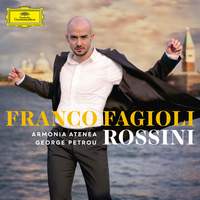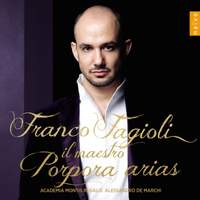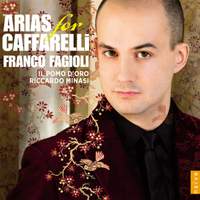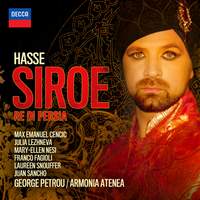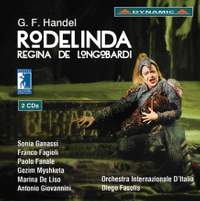Interview,
Franco Fagioli on Rossini
 Four years after he first knocked me sideways with his astonishing performance as Arbace on the world premiere recording of Leonardo Vinci's Artaserse for Erato, my jaw still drops every time I listen to the extraordinary voice ('heldencountertenor'?) of Franco Fagioli - the Argentine singer's three-octave range, prodigious agility and command of vocal colour make him one of the most exciting singers I've come across in the past few years. For his debut disc on Deutsche Grammophon, he's focused on Rossini's swashbuckling trouser-roles, many of which are comparative rarities on disc, and the results are every bit as thrilling as his earlier solo discs exploring the music of Nicola Porpora and the career of the notorious superstar castrato Gaetano Majorano (aka Caffarelli).
Four years after he first knocked me sideways with his astonishing performance as Arbace on the world premiere recording of Leonardo Vinci's Artaserse for Erato, my jaw still drops every time I listen to the extraordinary voice ('heldencountertenor'?) of Franco Fagioli - the Argentine singer's three-octave range, prodigious agility and command of vocal colour make him one of the most exciting singers I've come across in the past few years. For his debut disc on Deutsche Grammophon, he's focused on Rossini's swashbuckling trouser-roles, many of which are comparative rarities on disc, and the results are every bit as thrilling as his earlier solo discs exploring the music of Nicola Porpora and the career of the notorious superstar castrato Gaetano Majorano (aka Caffarelli).
Franco took some time out from preparing to sing the title-role in Cavalli's Eliogabalo in Paris (the production runs until 15th October) to talk to me about genre and gender, Rossini's debt to the great baroque composers, and his plans for the future…
People often talk of the special affection and flair in Rossini's writing for his mezzo heroines (partly because of his muse Isabelle Colbran) - do you think he had a similar affinity for writing for the male voice, or in writing male roles, in the same register?
Mezzo-sopranos must adore Rossini, I think, because he wrote the most beautiful operatic roles for them. But I think with this CD of mine, the interesting thing is the melancholy that Rossini shows in writing these male heroic roles for a high voice, and this is related to the baroque tradition of writing the heroic roles for castratos. So this is what I am trying to explore here – the idea of Rossini as a son of the baroque composers.
How different are its challenges to the baroque repertoire you've been focusing on over the past few years? Do you think the way composers were writing for the castrati by the early nineteenth century had altered very much in the hundred years or so since Handel, Hasse and Vinci?
I think there is a difference in what I like to call the musical speech, the musical lines and certain conventions of the musical style. But in the serious operas you can see a very close attachment to the baroque tradition – big arias, lot of coloratura etc. The difference for me is sometimes in the use of vocal registers but also the vocal line, which is closely related to the styles of melodies that were more used in the later years of Handel, Hasse, Vinci and even on into Mozart. That’s what I find here, this constant looking to the past. But it’s also related to this concept of bel canto that was reinvented in the nineteenth century: that happened because of this nostalgia for the 'golden age' of opera, the castrato times, with these great teachers and composers like Porpora. In terms of the musical writing, there are of course certain differences - but if you know how to read in between the lines, you can find this connection.
Compared to the comic operas, Rossini's opera serias are relatively rarely performed (and recorded) these days - do you think that's partly because they really call out for a male voice (rather than a female mezzo) to do them justice?
Rossini’s serious operas are great, and I think all his musical geniality is really expressed very well there. The arias on this recording are not first recordings – you have examples of other colleagues doing this (both mezzo-sopranos and countertenors), but in my case what I wanted to show is this timeline in between a very young Rossini and the very experienced genius he'd become by Semiramide. I don’t think the serious operas are less done because of the male/female voice situation, because great mezzos have done these parts brilliantly (a lot of them are totally my inspiration and I admire them a lot) – I think the serious operas are done less because of programming concerns in opera houses. The comic operas are great, of course, but these serious operas should also be admired and taken as a different facet of Rossini. That said, I must say think it’s so funny to see how Rossini was very clever and used the exact same music for comic and serious works! One example I can give is that the overture for Aureliano in Palmira is the very same overture that he later used for Il Barbiere di Siviliglia, so you see – comic-serious, serious-comic. We can’t get too picky about it!
Many of the roles here were originally sung by female contraltos - would you ever consider singing more bel canto trouser-roles, like Romeo in I Capuleti, Smeton in Anna Bolena, Urbain in Les Huguenots and Orsini in Lucrezia Borgia, or are you more interested in bringing music for the castrati back to life?
Actually on this CD there are no roles written for castratos – I didn’t include the only two pieces he wrote for them ,Aureliano in Palmira and [the cantata] Il vero omaggio (these two were written for Velutti, let’s say the last castrato on stage in Rossini’s time). This CD includes a lot of the operatic roles that Rossini wrote with this melancholy of the castrato time, but these are all trouser-roles premiered by women. Would I like to do more trouser-roles? Of course! I wouldn’t do them all, but the ones I feel I fit me vocally and I can sing properly – yes, I will try them!
You're singing your first Arsace in Semiramide in Nancy in the spring - do you have plans to sing any more Rossini on stage?
I’m very happy to be about to debut Arsace – it’s great that Nancy, the Opéra national de Lorraine, invited me to do this. Actually they invited me previously to sing Sesto in La Clemenza di Tito, and it’s wonderful to have the opportunity to walk this way and sing these parts: I’d love to do Malcolm in La donna del Lago, the title-role in Tancredi… I have already been invited to do Aureliano in Palmira and the Petite Messe Solennelle, and now’s the time for Arsace! And I hope more Rossini roles will come...
Our thanks to Ophelias Culture PR for making this interview possible.
Available Formats: MP3, FLAC, Hi-Res FLAC
You can view his complete available discography here.
Franco Fagioli (countertenor), Academia Montis Regalis, Alessandro de Marchi
Available Formats: MP3, FLAC
Franco Fagioli (countertenor), Il Pomo d’Oro, Riccardo Minasi
Available Formats: MP3, FLAC, Hi-Res FLAC
Max Emanuel Cencic (Siroe), Franco Fagioli (Medarse), Julia Lezhneva (Laodice), Juan Sancho (Cosroe), Mary-Ellen Nesi (Emira), Laureen Snouffer (Arasse); Armonia Atenea, George Petrou
Available Formats: MP3, FLAC, Hi-Res FLAC
Sonia Ganassi (Rodelinda), Franco Fagioli (Bertarido), Paolo Fanale (Grimoaldo), Gezim Myshketa (Garibaldo), Marina De Liso (Eduige), Antonio Giovannini (Unulfo); Orchestra Internazionale d’Italia, Diego Fasolis
Available Formats: 2 CDs, MP3, FLAC


